Leaders face a tough reality: Turning great ideas into finished projects is harder than ever. Teams span multiple departments, priorities shift constantly, and resources are limited. Without proper execution skills, even brilliant strategies fail.
Project management skills bridge this gap. They transform stalled initiatives into successful outcomes by helping you coordinate teams, optimize resources, and hit deadlines. This guide covers 20 essential competencies every leader needs — from planning and risk management to communication and team leadership.
Master these skills to build faster, more aligned teams that consistently deliver. With structured execution and clear communication, you’ll turn ambitious goals into real achievements and create a results-driven culture that propels your business forward.
Try monday work managementKey takeaways
- Project management skills like communication, organization, and risk assessment are critical for every leader today, not just project managers, as work becomes more complex and crosses multiple departments.
- These competencies directly impact your bottom line by helping teams deliver faster, waste less money, and adapt quickly when markets change, giving organizations a competitive advantage through agility and resource optimization.
- The 20 core skills range from technical abilities like budgeting and scheduling to people skills like emotional intelligence and stakeholder management, all of which can be developed through practical experience rather than formal training.
- You can start applying these skills immediately through high-impact actions like creating visual workflows, holding brief daily check-ins, and documenting decisions clearly to create visible improvements in any team.
- Platforms like monday work management help leaders scale these skills across their organization by providing templates, automation, and visibility that turn good intentions into consistent execution.
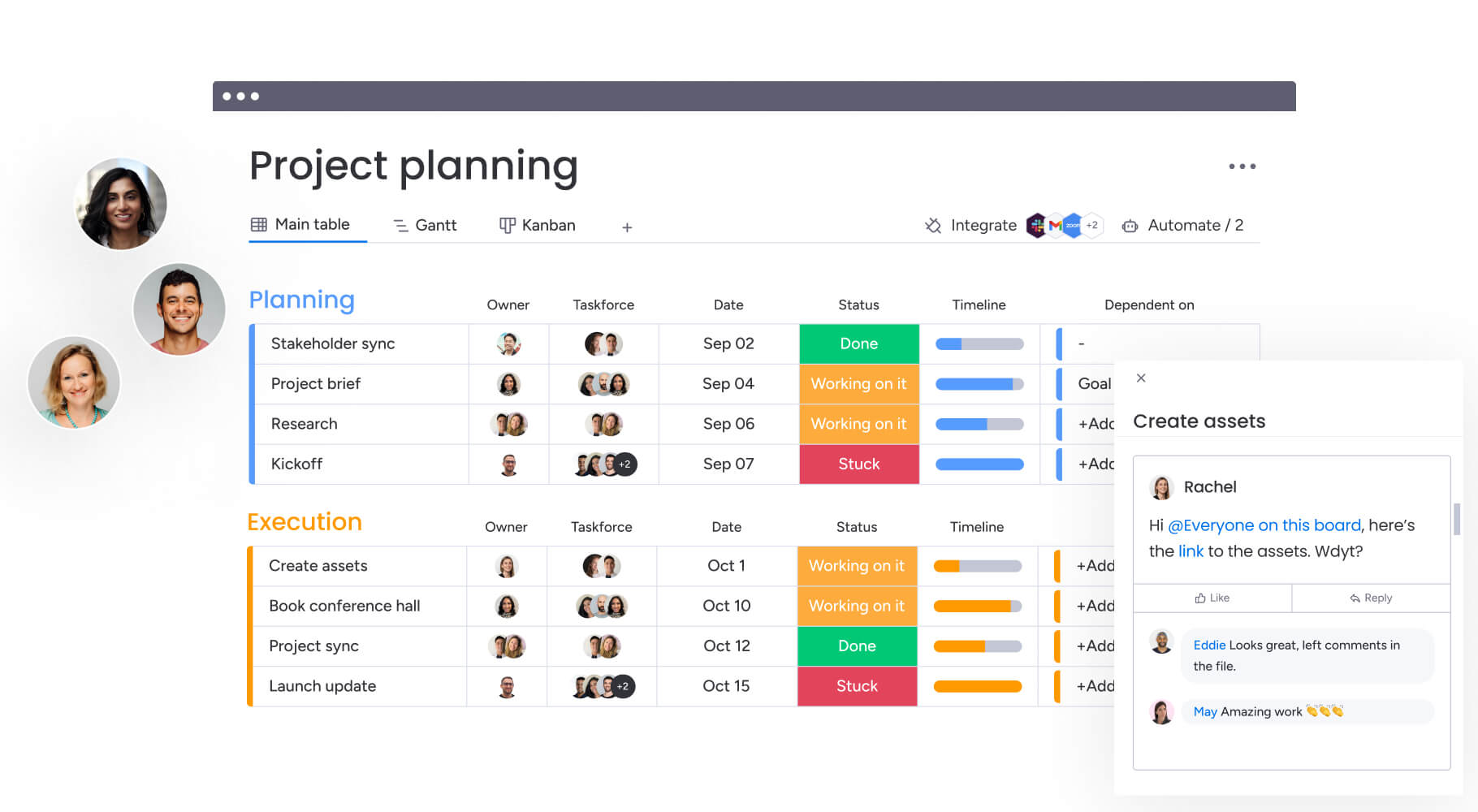
What are project management skills
Project management skills are the abilities that help you plan, execute, and deliver work successfully. These include technical skills like budgeting and scheduling, people skills like communication and leadership, and strategic skills like risk management and stakeholder alignment.
Every leader — not just project managers — needs these competencies. As work becomes more complex and crosses more departments, you need to coordinate people, manage resources, and deliver results through others. Plus, the scale of this shift is massive. In 2017, the Project Management Institute forecasted that the value of project-oriented economic activity would reach $20 trillion by 2027, creating roughly 88 million jobs in project management-related roles.
Why every leader needs these core competencies
These skills aren’t just for project managers. As work becomes more complex — spanning multiple teams, shifting priorities, and faster timelines — leaders at every level need to coordinate people, manage resources, and deliver results through others.
The leadership gap is real: a Deloitte study found that 85% of business leaders believe their organizations aren’t effectively developing leadership capabilities at all levels — a shortfall that can erode morale, increase turnover, and weaken strategic direction. Without project management skills, leaders struggle to keep pace, budgets balloon, and opportunities slip away.
With them, you gain a competitive edge through agility, efficiency, and the ability to turn strategy into measurable results.
Try monday work management20 essential project management skills
Project management requires a mastery of orchestrating people, resources, and timelines to achieve meaningful outcomes. The following skills represent the core competencies that separate high-performing leaders from the rest. Whether you’re managing complex enterprise initiatives or small team projects, mastering these abilities will dramatically improve your execution capacity and team performance.
1. Communication and collaboration
Communication means sharing information clearly with different audiences. You translate technical details for executives, explain strategy to teams, and keep everyone aligned on goals.
Poor communication causes delays and confusion. Strong communicators prevent these problems by creating transparency and building trust across teams.
2. Organization and time management
Organization is structuring work so nothing falls through the cracks. Time management means meeting deadlines while balancing competing priorities.
Organized leaders handle multiple projects without dropping details. They know what needs attention now versus what can wait until tomorrow.
3. Risk assessment and mitigation
Risk management identifies problems before they happen. You spot potential delays, budget issues, or resource conflicts early.
Leaders who manage risk well protect their organizations from costly surprises. They create backup plans and monitor warning signs throughout projects.
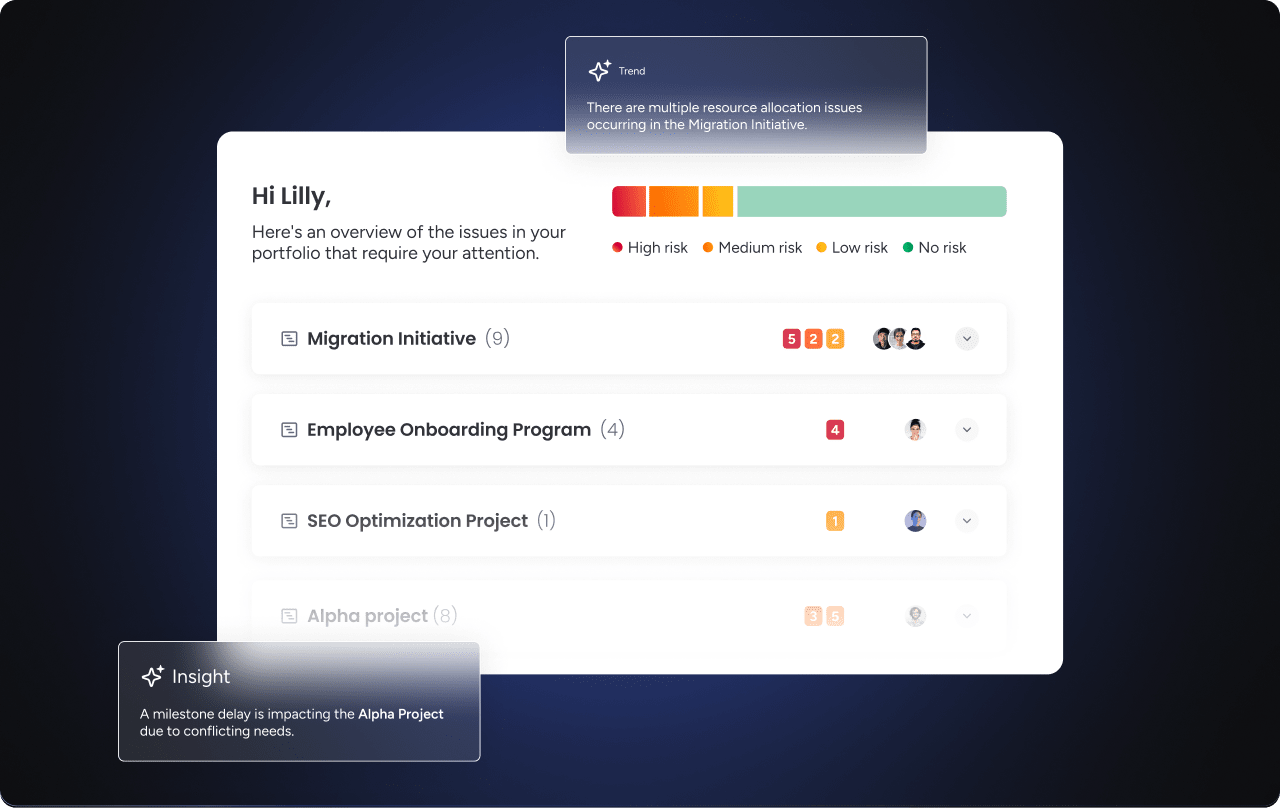
4. Budgeting and financial oversight
Budgeting means planning and tracking project costs. You estimate expenses, monitor spending, and report financial status to stakeholders.
Good financial management delivers more value with available resources. It shows executives you can be trusted with company investments.
5. Project initiation and planning
Project initiation defines what success looks like. Planning creates the roadmap to get there, including timelines, resources, and milestones.
Clear initiation prevents scope creep and confusion. Teams know exactly what they’re building and why it matters to the business.
6. Work prioritization for complex workflows
Prioritization means identifying which work delivers the most value. You sequence activities based on importance, dependencies, and available resources.
Effective prioritization keeps teams focused on what matters most. When everything seems urgent, you help people see what actually drives results.
7. Stakeholder management
Stakeholder management keeps everyone who affects your project engaged and aligned. You identify key players, manage expectations, and facilitate decisions.
Strong stakeholder management prevents political roadblocks. It ensures you have support when you need approvals or resources. With monday work management, leaders can track stakeholder communications and maintain visibility across complex projects.
8. Change management
Change management guides people through transitions. You help teams adopt new processes while maintaining productivity.
Leaders who manage change well implement improvements without disrupting operations. They understand that people need time and support to adapt, especially since there is often a significant perception gap on the subject. According to The world of work report from monday.com, 45% of senior leaders believe change is managed “very well,” while only 23% of individual contributors feel the same.
9. Technical skills for IT projects
Technical skills mean understanding technology enough to make informed decisions. You don’t need to code, but you need to grasp how systems work together.
Technical literacy helps you evaluate options and communicate with IT teams. It bridges the gap between business needs and technical solutions.
10. Team leadership and motivation
Team leadership inspires people to do their best work. You provide direction, remove obstacles, and celebrate achievements, and that clarity is critical; employees who understand how their success is measured are twice as likely to feel motivated, according to The world of work report.
Strong leaders create environments where teams thrive. They adapt their style to different people while maintaining high standards.
11. Adaptability in hybrid environments
Adaptability means adjusting your approach when circumstances change. You manage remote and in-person teams equally well.
Flexible leaders maintain productivity regardless of where people work. They use technology to keep distributed teams connected and engaged.
12. Critical thinking and problem solving
Critical thinking analyzes complex situations objectively. You evaluate options, consider different perspectives, and find creative solutions.
Leaders who think critically navigate uncertainty with confidence. They turn ambiguous problems into clear action plans.
13. Decision making under pressure
Decision-making under pressure means choosing wisely when time is short. You gather available information and act decisively.
Quick, quality decisions keep projects moving. Leaders who hesitate create bottlenecks that slow entire teams.
14. Quality control and assurance
Quality control ensures deliverables meet standards. You set criteria, conduct reviews, and implement improvements.
Consistent quality protects your reputation and reduces rework. It shows stakeholders they can trust your team’s output.
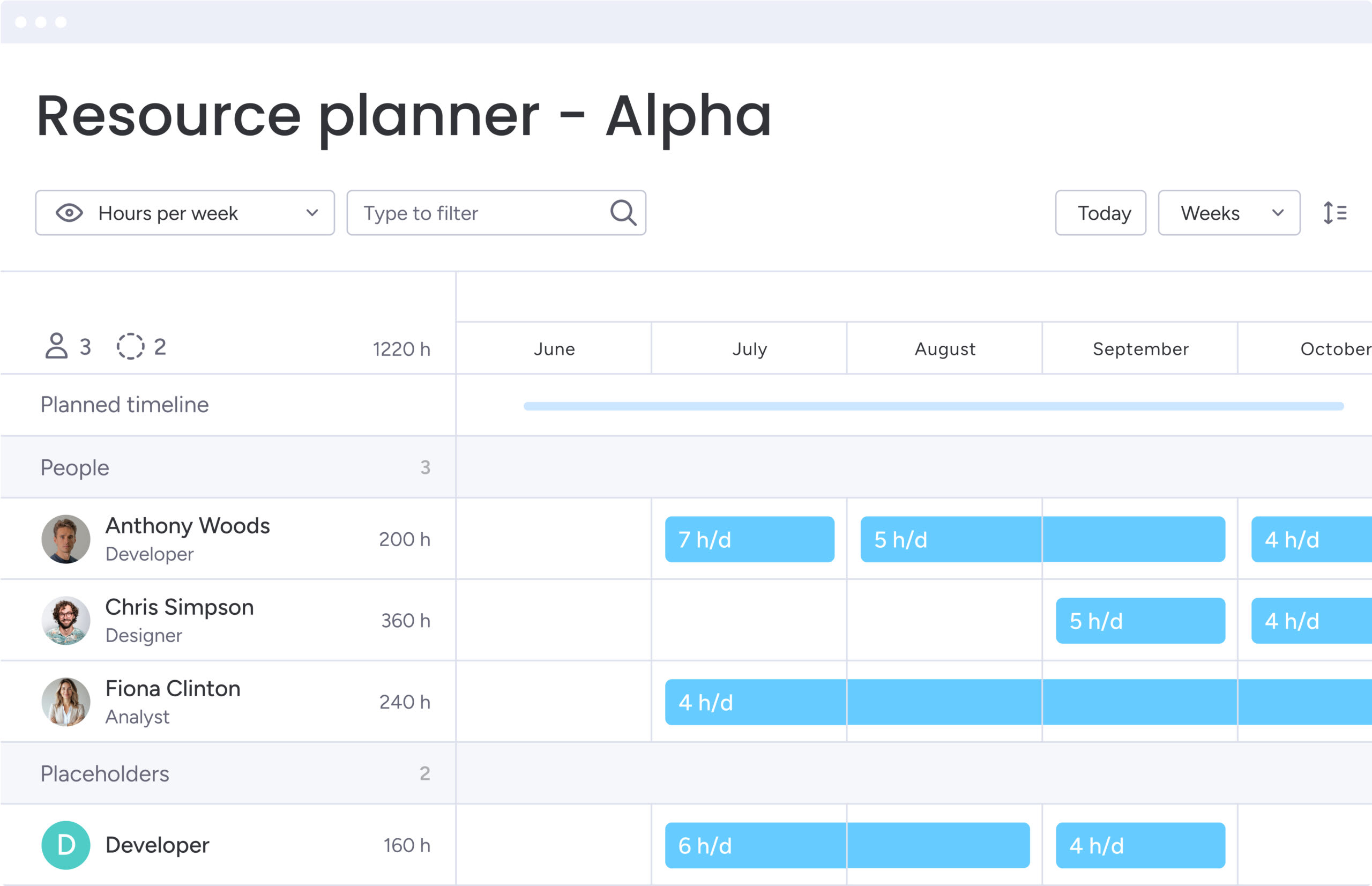
15. Scheduling and resource allocation
Scheduling sequences work activities efficiently. Resource allocation assigns the right people to the right work at the right time.
Good scheduling prevents bottlenecks and conflicts. It ensures you use available resources wisely without overloading teams.
16. Documentation and reporting
Documentation captures important decisions and processes. Reporting communicates progress and issues to stakeholders clearly.
Proper documentation enables knowledge sharing and compliance. It helps teams learn from experience and scale successful approaches.
17. Agile and iterative methods
Agile methodology delivers work in small, frequent increments. You gather feedback early and adjust based on what you learn.
Agile approaches help teams respond quickly to changes. They reduce risk by validating ideas before major investments.
18. Negotiation and conflict resolution
Negotiation finds solutions when people want different things. Conflict resolution addresses disagreements before they damage relationships.
Leaders who negotiate well maintain team harmony. They turn competing interests into collaborative solutions.
19. Emotional intelligence at work
Emotional intelligence recognizes and manages emotions productively. You understand how feelings affect performance and relationships.
Emotionally intelligent leaders build stronger teams. They navigate difficult conversations while maintaining trust and respect.
20. AI and automation proficiency
AI proficiency means understanding how artificial intelligence enhances work. You identify opportunities to automate routine activities and improve decision-making.
Leaders who embrace AI achieve more with existing resources. Modern solutions like monday work management feature native AI capabilities for analyzing project data and streamlining workflows automatically to ensure project success.
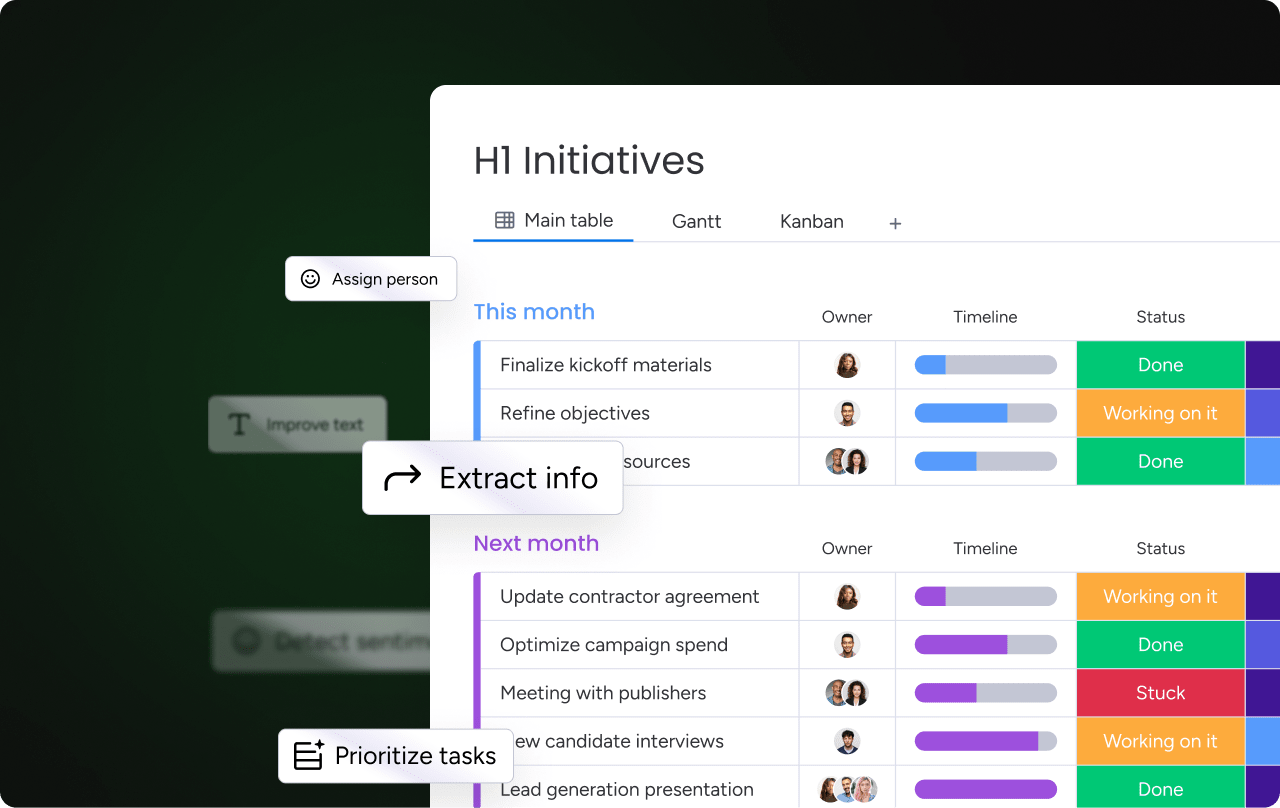
How to develop and strengthen these skills
Building project management skills doesn’t require formal training programs. You can develop capabilities through everyday work experiences, but they should be intentional. According to the Project Management Institute’s 2024 Pulse of the Profession report, organizations that offer structured development programs, including mentoring, communities of practice, and formal training, see an 8.3% increase in project performance.
Start with these practical approaches:
- Lead a cross-functional project: Volunteer for initiatives that span departments.
- Shadow experienced leaders: Watch how they handle meetings, decisions, and conflicts.
- Use work management platforms: Practice with platforms like monday work management to build technical skills.
- Request feedback regularly: Ask team members what’s working and what isn’t.
- Join professional communities: Connect with other leaders facing similar challenges.
Pairing consistent practice with structured learning opportunities accelerates growth, helping you lead projects that finish on time, on budget, and aligned with business goals.
Try monday work managementPractical ways to apply these skills in any team
You can start using project management skills immediately, regardless of your role. Focus on small changes that create visible improvements.
Begin with these high-impact actions:
- Create visual workflows: Make work visible so everyone knows current status.
- Hold brief daily check-ins: Keep teams aligned without long meetings.
- Document decisions clearly: Record who decided what and why.
- Set realistic deadlines: Build in buffer time for unexpected issues.
- Celebrate small wins: Recognize progress to maintain momentum.
How do modern teams differ from traditional approaches? Today’s leaders focus on transparency, flexibility, and continuous improvement rather than rigid processes.
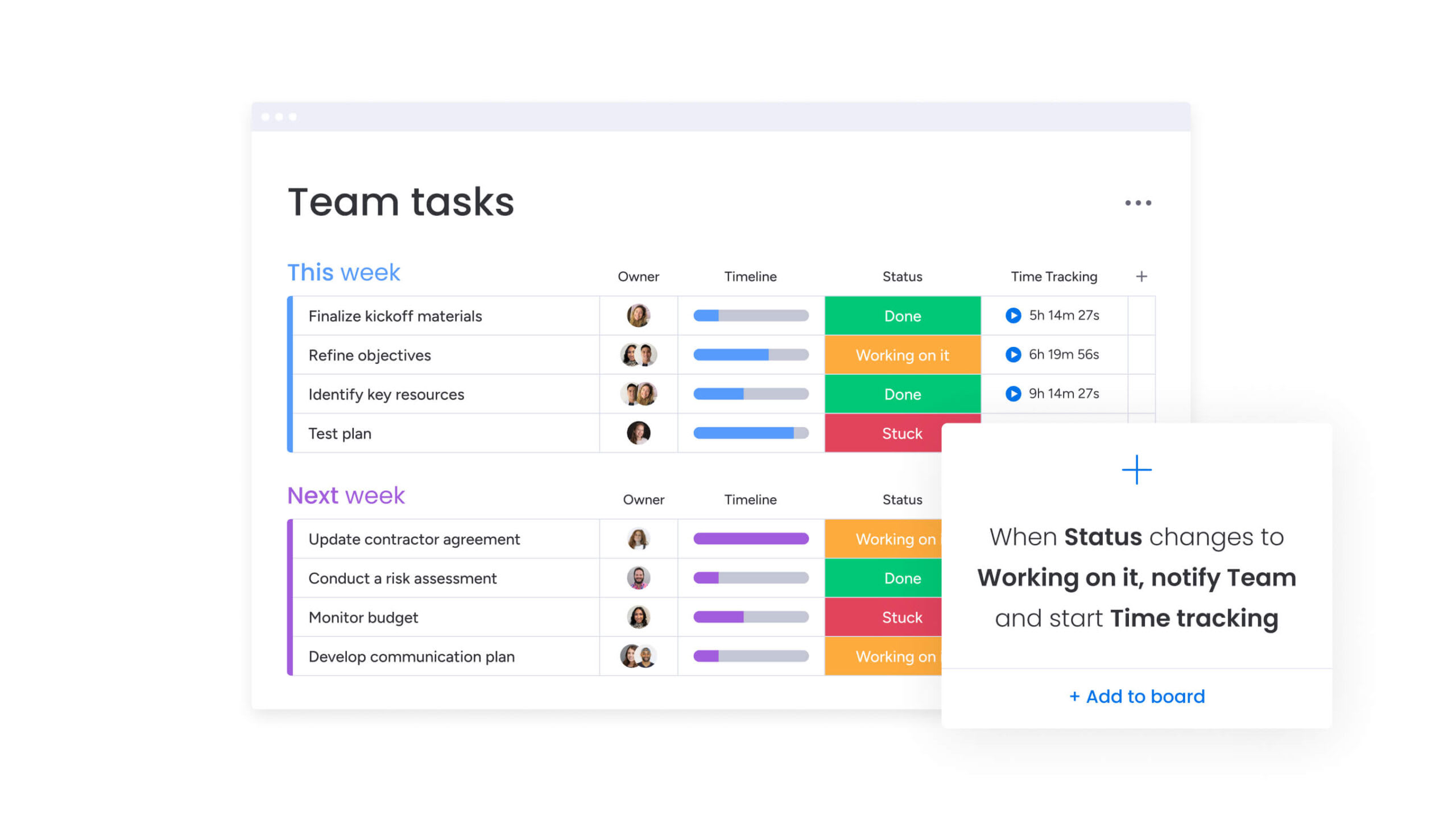
Overcoming common project management challenges
Even experienced leaders face challenges when developing project management skills. Recognizing these patterns helps you avoid them.
Watch for these common mistakes:
- Analysis paralysis from spending too much time planning without starting
- Information overload from sharing every detail instead of key updates
- Perfectionism from waiting for ideal conditions instead of making progress
- Ignoring relationships by focusing only on tasks while neglecting people
- Tool resistance by avoiding new platforms that could simplify work
The solution? Start small, focus on progress over perfection, and use platforms like monday work management to automate routine work.
Try monday work managementWhy monday work management is the ultimate platform for building project management skills
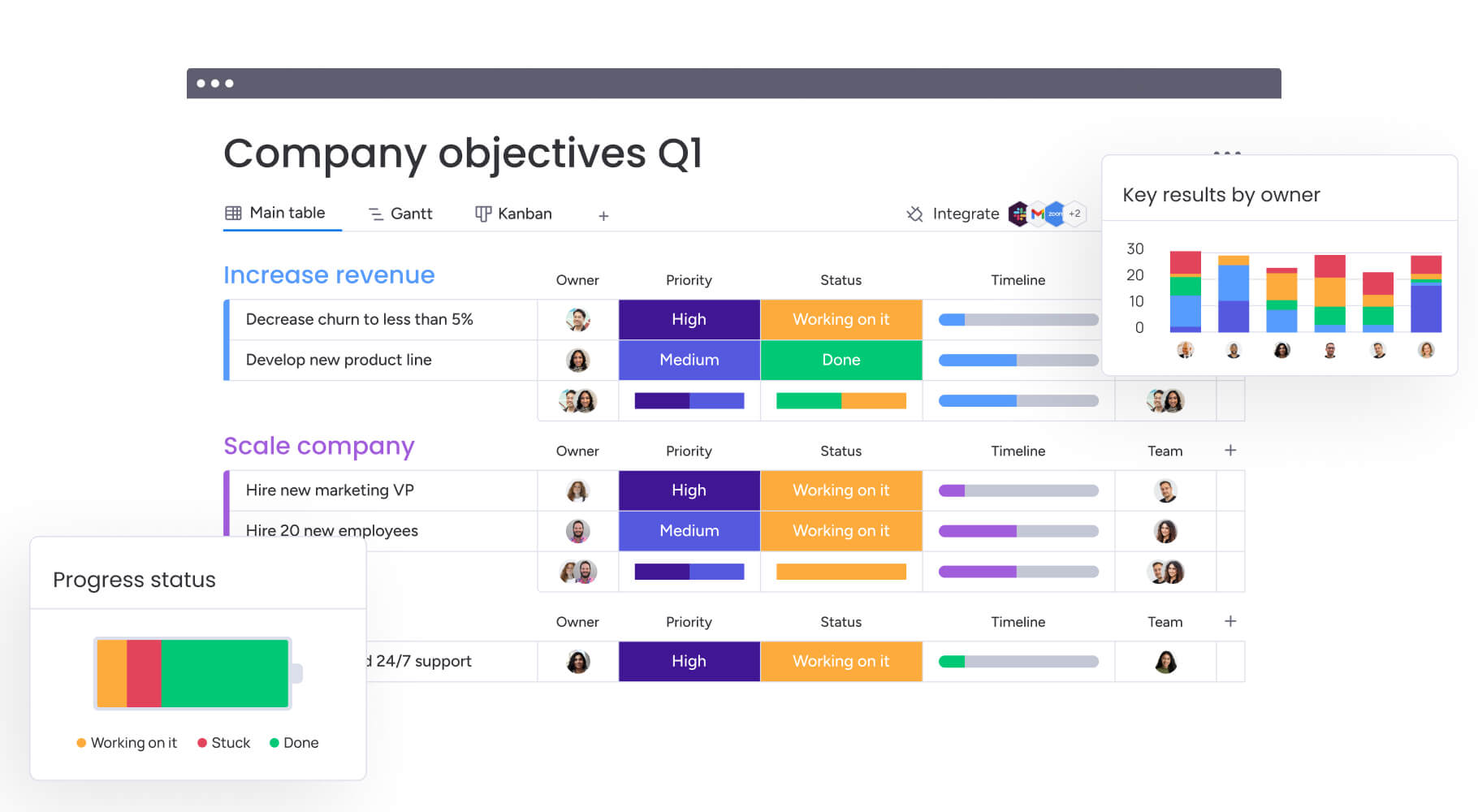
Whether you’re just getting started or scaling best practices across your organization, monday work management empowers leaders to put these project management skills into action. Its intuitive, flexible platform makes it easy to apply core competencies like communication, organization, and resource optimization in real time.
Here’s how monday work management supports your skill development:
- Visual workflows and dashboards: Create clear, customizable project boards that keep everyone aligned and make progress visible at a glance.
- Automation and AI tools: Streamline repetitive tasks, get insights from project data, and free up your team to focus on high-value work.
- Integrated communication: Centralize updates, decisions, and feedback within each project so nothing falls through the cracks.
- Templates for every use case: Jumpstart new initiatives with best-practice templates for project planning, risk management, stakeholder tracking, and more.
- Adaptable to any workflow: Whether you’re running Agile sprints, managing remote teams, or tracking budgets, monday work management flexes to fit your needs.
By combining powerful features with an easy-to-use interface, monday work management accelerates your ability to build — and sustain — world-class project management skills.
Elevate your organization with better project management
Strong project management skills transform how organizations operate. Teams move faster, waste less, and achieve more ambitious goals.
The impact goes beyond individual projects. Organizations with mature project management capabilities respond quickly to market changes and maintain competitive advantage through operational excellence.
If you’re ready to apply these skills at scale, monday work management provides templates, automation, and visibility to turn your good intentions into consistent execution.
Try monday work managementFAQs
What are the most important project management skills for beginners?
The most important project management skills for beginners are communication, organization, and time management. These foundational abilities help you coordinate work effectively while building credibility with your team and stakeholders.
How can I improve my project management skills without formal certification?
You can improve project management skills by leading small projects, using work management platforms for practice, seeking mentorship from experienced leaders, and applying new techniques to your current role. Real-world experience often teaches more than classroom training.
What project management skills do employers value most?
Employers value project management skills that drive business results, including stakeholder management, risk mitigation, budget control, and the ability to deliver projects on time. They also prize adaptability and emotional intelligence for managing diverse teams.
Which project management skills help with career advancement?
Project management skills that accelerate career advancement include strategic thinking, change management, executive communication, and financial oversight. These capabilities show you can handle increasing responsibility and drive organizational success.
How do project management skills differ across industries?
In their application, project management skills vary by industry, but their core principles remain the same. For example, healthcare projects emphasize compliance and risk management, while tech projects focus on agility and rapid iteration. But the fundamental skills of planning, communication, and execution remain constant.
What project management skills are essential for remote team leadership?
Remote team leadership requires strong digital communication, visual project tracking, asynchronous collaboration, and trust-building skills. Leaders must create transparency and maintain team cohesion without daily face-to-face interaction.
